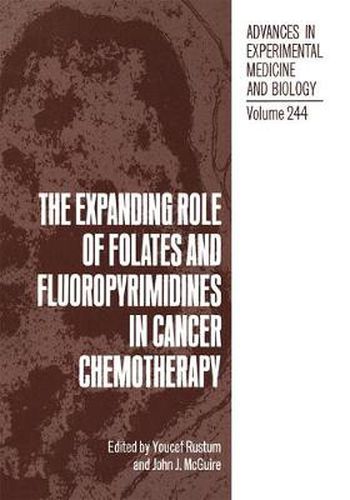Readings Newsletter
Become a Readings Member to make your shopping experience even easier.
Sign in or sign up for free!
You’re not far away from qualifying for FREE standard shipping within Australia
You’ve qualified for FREE standard shipping within Australia
The cart is loading…






This title is printed to order. This book may have been self-published. If so, we cannot guarantee the quality of the content. In the main most books will have gone through the editing process however some may not. We therefore suggest that you be aware of this before ordering this book. If in doubt check either the author or publisher’s details as we are unable to accept any returns unless they are faulty. Please contact us if you have any questions.
Although 5-fluorouracil (Fura) is the drug of choice for the treat- ment of patients with advanced colorectal cancer, this agent has limited effectiveness with a reported response rate of 10-20% and a duration of response of only 6-9 months. The large percentage of treatment failures with this agent has spurred a continuing effort to delineate the mechanism(s) of resistance to Fura and to evaluate approaches that would selectively modulate the therapeutic efficacy of this agent. The therapeutic efficacy of FUra has been attributed to its selec- tive incorporation into RNA and to its inhibition of thymidylate syn- thase, leading to potent inhibition of DNA synthesis. Studies of cell lines in vitro and model systems in vivo have demonstrated that although mechanism sensitivity and resistanc; to Fura are multifactorial, in the presence of citrovorum factor (CF, 5-formyltetrahydrofolate) the site of action of Fura becomes predominantly the pronounced and pro- longed inhibition of thymidylate synthase. This action is the result of stabilization of the covalent ternary complex between FdUMP, an active metabolite of FUra, 5,10-methylenetetrahydrofolates, and thymidylate synthase. This effect of CF is thus an example of the concept of meta- bolic modulation.
$9.00 standard shipping within Australia
FREE standard shipping within Australia for orders over $100.00
Express & International shipping calculated at checkout
This title is printed to order. This book may have been self-published. If so, we cannot guarantee the quality of the content. In the main most books will have gone through the editing process however some may not. We therefore suggest that you be aware of this before ordering this book. If in doubt check either the author or publisher’s details as we are unable to accept any returns unless they are faulty. Please contact us if you have any questions.
Although 5-fluorouracil (Fura) is the drug of choice for the treat- ment of patients with advanced colorectal cancer, this agent has limited effectiveness with a reported response rate of 10-20% and a duration of response of only 6-9 months. The large percentage of treatment failures with this agent has spurred a continuing effort to delineate the mechanism(s) of resistance to Fura and to evaluate approaches that would selectively modulate the therapeutic efficacy of this agent. The therapeutic efficacy of FUra has been attributed to its selec- tive incorporation into RNA and to its inhibition of thymidylate syn- thase, leading to potent inhibition of DNA synthesis. Studies of cell lines in vitro and model systems in vivo have demonstrated that although mechanism sensitivity and resistanc; to Fura are multifactorial, in the presence of citrovorum factor (CF, 5-formyltetrahydrofolate) the site of action of Fura becomes predominantly the pronounced and pro- longed inhibition of thymidylate synthase. This action is the result of stabilization of the covalent ternary complex between FdUMP, an active metabolite of FUra, 5,10-methylenetetrahydrofolates, and thymidylate synthase. This effect of CF is thus an example of the concept of meta- bolic modulation.